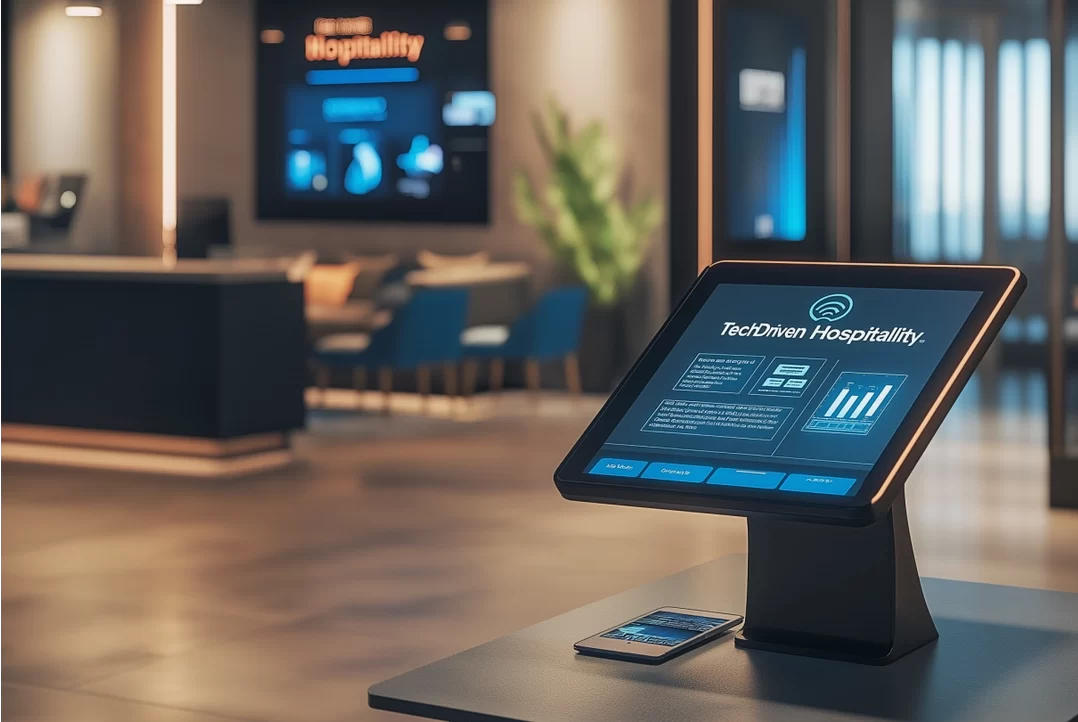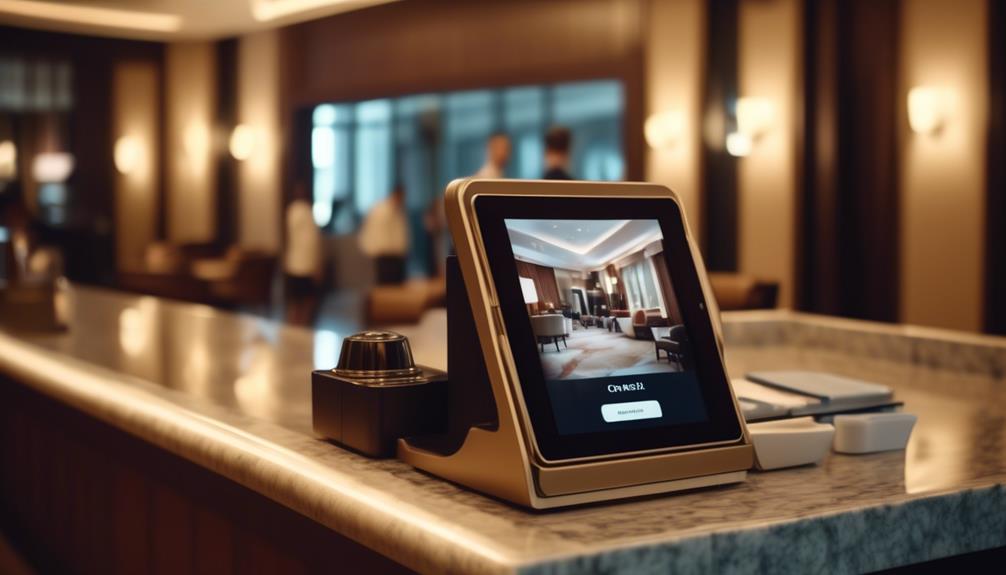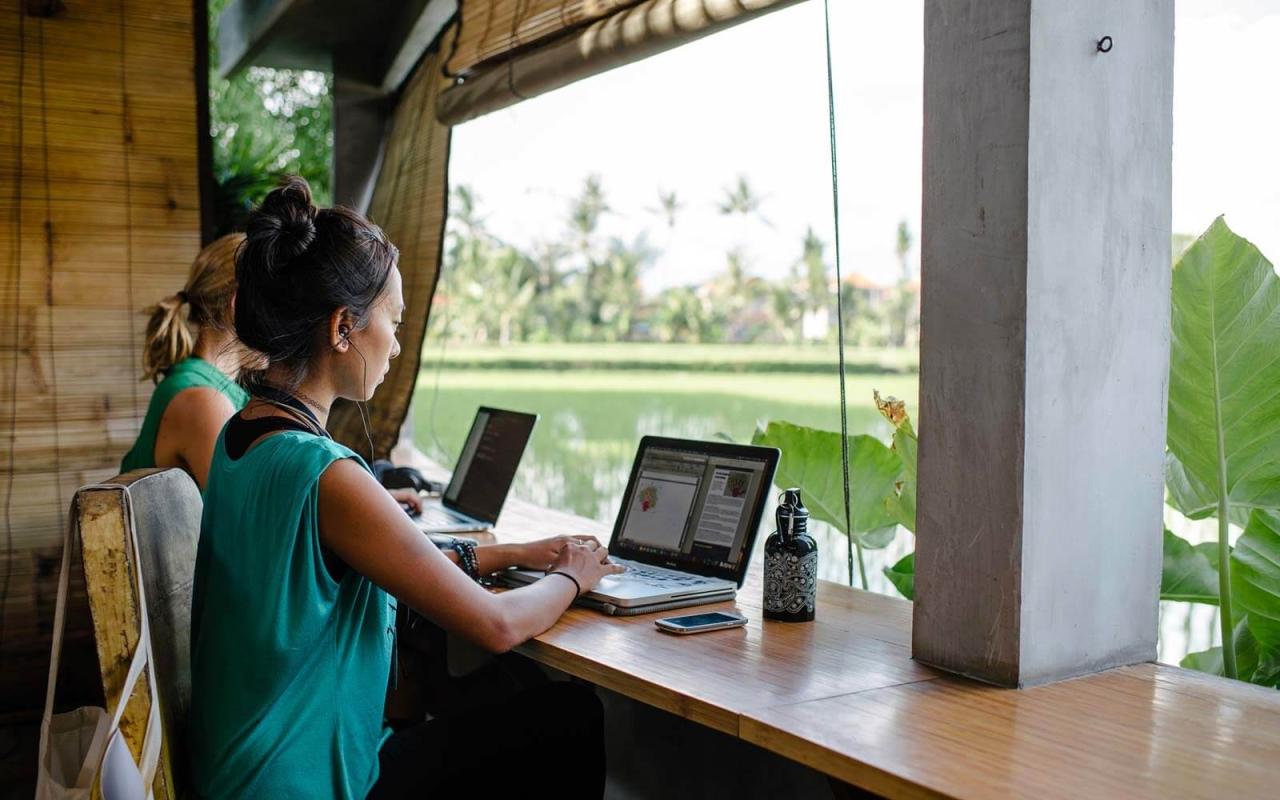The landscape of hospitality is undergoing a seismic shift, propelled by rapid advancements in technology. Today, tech-driven hospitality is no longer a futuristic concept; it’s a present reality, reshaping every facet of the guest experience, from initial booking to post-stay engagement. This technological embrace is about more than just novelty; it’s about enhancing efficiency, personalizing interactions, and creating seamless, memorable journeys that cater to the modern traveler’s evolving demands. This comprehensive exploration delves into how innovation is redefining comfort, convenience, and connection in the world of hotels and resorts.
The Digital Transformation of Guest Journeys

Technology’s influence now permeates the entire guest lifecycle, orchestrating a more intuitive and personalized experience. This digital transformation begins long before arrival and extends far beyond departure.
A. Pre-Arrival
The journey starts with the digital footprint. Guests expect effortless research, booking, and pre-stay interactions.
A. Enhanced Online Presence and Booking Platforms: Hotels are investing heavily in sophisticated, user-friendly websites with high-resolution imagery, virtual tours, and intuitive booking engines. Integration with major Online Travel Agencies (OTAs) and metasearch engines is crucial for visibility. SEO optimization ensures properties appear prominently in search results, attracting organic traffic. These platforms are designed to be mobile-first, recognizing that most travelers now research and book on their smartphones. Personalized recommendations based on past searches or loyalty program data also entice bookings. This digital storefront often serves as the first point of contact, making its design and functionality paramount to securing reservations.
B. AI-Powered Chatbots and Virtual Concierges: Before guests even arrive, AI-powered chatbots on websites and messaging apps provide instant answers to frequently asked questions about amenities, local attractions, and check-in procedures. These virtual concierges can handle basic inquiries 24/7, freeing up human staff for more complex requests and ensuring rapid response times, which significantly improves the pre-booking and pre-arrival experience. They can also upsell services or recommend activities, acting as an always-on information hub. The goal is to provide immediate assistance, reducing friction and enhancing the customer service experience even before a physical interaction.
C. Personalized Pre-Arrival Communications: Leveraging guest data from loyalty programs or previous stays, hotels send personalized emails or app notifications. These might include tailored welcome messages, pre-check-in options, activity recommendations based on stated interests, or exclusive offers for upgrades or amenities. This proactive communication builds anticipation and sets the stage for a customized stay. It shows guests they’re valued and that the hotel understands their preferences, moving beyond generic mass emails. For instance, if a guest previously enjoyed spa services, the hotel might send a special offer for a pre-booked massage.
D. Mobile Check-In and Keyless Entry: Many properties now offer mobile check-in via dedicated apps, allowing guests to bypass the front desk entirely. Following check-in, digital room keys are often delivered to their smartphone, enabling keyless entry via Bluetooth or NFC. This not only speeds up the arrival process but also provides a sense of control and convenience, appealing to tech-savvy travelers who prefer self-service options. This reduces queues and allows guests to head directly to their rooms upon arrival, a major time-saver for busy travelers.
E. Dynamic Pricing and Revenue Management: Sophisticated algorithms analyze vast amounts of data—including competitor pricing, local events, historical demand, and even weather forecasts—to adjust room rates in real-time. This dynamic pricing maximizes revenue for the hotel while often providing competitive rates for guests who book at optimal times. This ensures occupancy rates remain high and revenue streams are optimized. It’s a complex balancing act that leverages predictive analytics to respond instantly to market conditions.
B. During Stay
Once guests are on-site, technology continues to enhance their experience, offering convenience, control, and personalized services.
A. Smart Room Technology (IoT): The Internet of Things (IoT) is transforming hotel rooms into smart environments. Guests can control lighting, temperature, curtains, and entertainment systems via in-room tablets, their own smartphones, or even voice commands (e.g., through smart speakers like Amazon Alexa or Google Assistant). This provides unparalleled comfort and customization, tailoring the environment to individual preferences. Some systems even learn guest preferences over time, automatically adjusting settings for subsequent stays. This creates a truly bespoke atmosphere.
B. In-Room Entertainment and Connectivity: High-speed, reliable Wi-Fi is now a non-negotiable expectation; it’s considered a utility. Beyond that, smart TVs allow guests to stream their own content (Netflix, Hulu, YouTube) directly, providing a familiar entertainment experience. Some hotels offer curated content libraries, integrated streaming services, or even personalized welcome messages on the screen. USB charging ports and wireless charging pads are also becoming standard, recognizing the multitude of devices travelers carry.
C. Digital Concierge Services (Apps and Tablets): Dedicated hotel apps or in-room tablets serve as digital concierges. Guests can order room service, book spa appointments, request housekeeping, browse local attractions, communicate directly with staff, or even check out, all from the convenience of their room. This streamlines service delivery, reduces the need for phone calls, and provides a centralized hub for all guest needs. Notifications can alert guests when their order is ready or request is fulfilled.
D. Robotics and Automation: While still emerging, robots are appearing in various capacities:
* Delivery Robots: Autonomous robots deliver amenities like towels, toiletries, or food orders directly to guest rooms, reducing staff workload and offering a novel guest interaction, especially in larger properties.
* Housekeeping Robots: Robotic vacuum cleaners or floor scrubbers assist housekeeping staff, especially in large common areas, improving efficiency and cleanliness.
* Concierge Robots: Some hotels experiment with robots in the lobby to greet guests, provide basic information, or offer entertainment, often used as a novelty or for multilingual support.
* Luggage Handling Robots: Automated systems can transport luggage from the reception to rooms or storage, easing the burden on bellhops and speeding up service.
While not replacing human interaction entirely, they enhance efficiency and can cover basic, repetitive tasks.
E. Personalized Digital Signage: Interactive digital displays in lobbies, elevators, and common areas provide tailored information, such as personalized welcome messages for VIPs, real-time flight updates, local weather forecasts, or targeted promotions for on-site restaurants or events, based on loyalty program data or pre-set preferences. This keeps guests informed and subtly encourages engagement with hotel services.
C. Post-Stay
Technology extends its reach even after guests depart, fostering loyalty and gathering valuable feedback.
A. Digital Feedback and Surveys: Automated post-stay emails or app notifications prompt guests to provide feedback through surveys. This immediate feedback loop allows hotels to quickly identify areas for improvement and address any issues, demonstrating attentiveness and a commitment to guest satisfaction. This direct channel often yields more honest and detailed feedback than in-person comments.
B. Personalized Marketing and Loyalty Programs: Hotels use data collected during the stay (preferences, spending habits, amenities visited, special requests) to send highly targeted marketing messages and exclusive offers, encouraging repeat bookings. Loyalty programs are often managed digitally, with points tracking, tier status, and redemption of rewards seamlessly handled via dedicated apps or online portals, making it easy for guests to see the value.
C. Social Media Engagement and Reputation Management: Hotels actively monitor and engage with guests on social media platforms, responding promptly to reviews (both positive and negative), comments, and direct messages. This proactive reputation management helps build a strong online presence and fosters a community around their brand. User-generated content from satisfied guests becomes a powerful and authentic marketing tool.
D. AI-Driven Customer Relationship Management (CRM): Sophisticated CRM systems use AI to analyze guest data from various touchpoints (booking, stay, feedback, social media), creating comprehensive, dynamic guest profiles. This enables highly personalized communication and service delivery for future stays, allowing the hotel to anticipate needs and preferences even before they are explicitly stated, building deeper relationships.
E. Seamless Rebooking and Preference Storage: For loyalty members or frequent guests, platforms remember their preferences (e.g., favorite room type, dietary restrictions, preferred amenities) and make the rebooking process as simple as possible, often with one-click options for their favorite room or package. This reduces friction and encourages return visits.
Why Tech-Driven Hospitality Thrives

The pervasive integration of technology in hospitality yields substantial advantages for both hoteliers and guests.
For Guests:
A. Unprecedented Convenience: From mobile check-in and keyless entry to in-room controls and digital concierge services, technology streamlines every interaction, saving time, reducing queues, and minimizing friction at every touchpoint of their journey.
B. Enhanced Personalization: AI and data analytics enable deeply tailored experiences, from pre-set room temperatures to personalized local recommendations, making guests feel uniquely valued, understood, and truly at home. This moves beyond generic service to truly bespoke offerings.
C. Increased Control: Guests have more autonomy and control over their environment (e.g., room settings) and services (e.g., ordering room service, booking amenities), empowering them to customize their stay to their exact preferences and schedule.
D. Improved Communication: Instant access to hotel staff and information via digital channels (chatbots, apps) ensures quicker resolution of issues, faster response times for requests, and more efficient communication overall, reducing frustration.
E. Faster Service Delivery: Automation of routine tasks and streamlined digital request systems mean amenities arrive quicker, and requests are fulfilled more efficiently, leading to a smoother and more enjoyable stay.
For Hoteliers:
A. Operational Efficiency and Cost Reduction: Automation of routine tasks (check-in/out, concierge FAQs, cleaning schedules via IoT) frees up staff to focus on high-value guest interactions, improving overall productivity and significantly reducing labor costs associated with repetitive manual processes.
B. Data-Driven Insights for Strategic Decisions: The wealth of data collected across all touchpoints allows hotels to gain deep insights into guest preferences, identify emerging trends, forecast demand more accurately, and make informed, proactive decisions regarding services, pricing strategies, marketing campaigns, and even future property developments.
C. Enhanced Guest Satisfaction and Loyalty: Personalized experiences, seamless service, and proactive problem-solving lead to demonstrably higher guest satisfaction scores, positive online reviews, and increased loyalty, which are crucial drivers for repeat business and positive word-of-mouth referrals.
D. Optimized Revenue Management: Dynamic pricing models and highly targeted upsell/cross-sell opportunities (e.g., suggesting a spa treatment or a premium dining experience based on guest profile) powered by AI maximize occupancy rates, average daily rate (ADR), and revenue per available room (RevPAR).
E. Reduced Human Error and Improved Accuracy: Automation minimizes mistakes in booking, billing, inventory management, and service delivery, leading to fewer complaints, chargebacks, and operational headaches, thereby improving overall accuracy and guest trust.
Key Technologies Driving the Future
Several core technologies are at the forefront of this revolution, continuously evolving and expanding their capabilities, forming the backbone of future hospitality.
A. Artificial Intelligence (AI) and Machine Learning (ML)
AI and ML are the brains behind personalization and efficiency, enabling systems to learn and adapt. They power:
- Predictive Analytics: Forecasting guest needs (e.g., preferred room temperature, likely amenity requests), identifying optimal pricing strategies based on complex market dynamics, and predicting maintenance issues before they occur.
- Recommendation Engines: Suggesting highly personalized activities, dining options, local excursions, or room upgrades based on guest profiles, past behaviors, and real-time context.
- Natural Language Processing (NLP): Enabling seamless and intuitive interactions with chatbots, virtual assistants, and voice-activated room controls, allowing guests to communicate naturally.
- Sentiment Analysis: Monitoring and analyzing vast amounts of guest feedback from reviews, surveys, and social media to gauge satisfaction levels, identify pain points, and pinpoint areas for immediate improvement, often in real-time.
- Fraud Detection: AI algorithms can identify unusual booking patterns or payment behaviors that might indicate fraudulent activity, enhancing security for both the hotel and legitimate guests.
B. Internet of Things (IoT)
IoT connects physical devices, allowing them to collect and exchange data, turning hotel properties into intelligent, responsive environments. This encompasses:
- Smart Rooms: Connected sensors and devices for automated climate control (adjusting based on occupancy), lighting (adaptive to time of day or mood), and entertainment systems, all controllable via a central interface.
- Asset Tracking: Monitoring the location and status of valuable hotel property (e.g., luggage, trolleys, specialized equipment) to prevent loss and improve efficiency.
- Predictive Maintenance: Sensors on critical equipment (HVAC, plumbing, elevators, kitchen machinery) signaling potential malfunctions or performance degradation before a breakdown occurs, allowing for proactive maintenance.
- Energy and Resource Management: Real-time monitoring and optimization of energy, water, and even waste consumption across the entire property, enabling significant cost savings and environmental footprint reduction.
- Occupancy Monitoring: Sensors detecting room occupancy to automatically adjust lighting, HVAC, and power, or to inform housekeeping schedules.
C. Big Data Analytics
The massive volume of structured and unstructured data generated by guest interactions, operational systems, social media, external market trends, and even competitor activities is analyzed to uncover actionable insights. Big data helps hotels:
- Understand Guest Behavior: Identify granular patterns and preferences across different guest segments, allowing for highly targeted service and marketing.
- Optimize Marketing Campaigns: Design and execute highly effective marketing campaigns by identifying the right audience, message, and channel based on detailed behavioral data.
- Improve Operational Efficiency: Pinpoint bottlenecks in service delivery, optimize staffing levels, manage inventory more effectively, and streamline back-of-house processes based on data-driven insights.
- Enhance Security: Detect unusual patterns in access logs, transactions, or surveillance feeds that might indicate security risks or fraudulent activities, enabling rapid response.
- Personalize Experiences at Scale: Segmenting guests into micro-groups based on a vast array of data points to deliver truly personalized experiences across all touchpoints.
Challenges and Considerations
Despite the immense opportunities, the path to fully tech-driven hospitality is not without its hurdles. Hoteliers must navigate these complexities thoughtfully.
A. Data Privacy and Security
The collection of vast amounts of sensitive guest data necessitates robust cybersecurity measures and strict adherence to evolving data privacy regulations (e.g., GDPR in Europe, CCPA in California, and similar emerging laws in Indonesia). A data breach can severely damage a hotel’s reputation, erode guest trust, and lead to significant legal and financial repercussions. Hotels must invest heavily in encryption, secure infrastructure, and regular security audits. Ethical data use and transparency with guests about data collection are paramount.
B. High Implementation Costs and ROI Justification
Investing in cutting-edge technology, from smart room systems to advanced AI platforms, can be exceptionally expensive, particularly for smaller independent hotels or those with limited capital. The challenge lies in accurately evaluating the return on investment (ROI), demonstrating how these technological upgrades translate into tangible benefits like increased revenue, improved guest satisfaction, and operational efficiencies, rather than just being a trendy expense. Long-term maintenance and upgrade costs also need to be factored in.
C. The Human Touch vs. Automation Balance
While technology enhances efficiency, hospitality fundamentally remains a people-centric industry. The critical challenge is to strike the right balance between automation and preserving the genuine human connection, empathy, and personalized service that many guests still highly value and often associate with luxury. Technology should augment and empower staff to provide better service, not replace meaningful human interaction where it matters most, particularly for complex problem-solving or emotional connections.
D. Technical Integration Complexity and Interoperability
Modern hotel operations involve numerous disparate technological systems (Property Management Systems, Point-of-Sale, CRM, Booking Engines, Smart Room Tech, HR systems, etc.). Integrating these systems seamlessly can be incredibly complex, requiring significant IT expertise, custom development, and ongoing maintenance. Ensuring interoperability – the ability for different systems to communicate and share data – is a major hurdle that often requires open APIs and standardized protocols.
E. Rapid Technological Obsolescence
The pace of technological change is relentless. What is cutting-edge today can become obsolete within a few years. Hotels need to invest in flexible, adaptable, and modular systems that can be easily upgraded, integrated with new innovations, or replaced without requiring massive, costly overhauls of their entire infrastructure. This requires a forward-thinking technology strategy that accounts for future trends.
The Future of Tech-Driven Hospitality
The trajectory of tech-driven hospitality points towards an even more interconnected, personalized, and efficient future, where technology seamlessly integrates into the fabric of the guest journey.
A. Hyper-Personalization Driven by Advanced AI: AI will become even more sophisticated, moving beyond basic recommendations to truly understand individual guest preferences, habits, and even moods, anticipating needs to an unprecedented degree. From pre-setting room ambiance based on past stays to suggesting hyper-tailored local experiences (e.g., a specific type of coffee shop, a niche art gallery) or proactive problem-solving (e.g., offering a late check-out if a guest’s flight is delayed, detecting stress levels from voice patterns and offering relevant services), every aspect will be curated before a guest even expresses a need.
B. Seamless, Invisible Technology: Technology will become less overtly visible but more pervasive and intuitive. Guests won’t necessarily interact with screens or apps as much, but rather enjoy the benefits of technology working seamlessly and intelligently in the background – responsive environments, intuitive services, and proactive solutions. Voice control, gesture control, and even thought-to-device communication (though far off) will become more natural and integrated into the physical space. The goal is for technology to disappear into the experience itself.
C. Sustainability Enhanced by Cutting-Edge Tech: Technology will play an absolutely crucial role in making hotels significantly more sustainable. IoT sensors will provide granular data to optimize energy and water usage down to individual appliances. AI will analyze food consumption patterns to drastically reduce waste. Blockchain could provide transparent and immutable tracking of sustainable sourcing for all hotel supplies. Tech will empower hotels to achieve ambitious environmental goals and contribute to a circular economy model.
D. The “Phygital” Experience Fully Realized: The blend of physical and digital experiences will deepen profoundly. Guests will interact with physical spaces that are augmented and enhanced by digital layers, creating truly immersive and interactive environments. Think of lobbies with dynamic, personalized digital art installations, rooms with interactive projections that change the ambiance, or AR-guided tours within the property that reveal hidden histories or narratives.
E. Advanced Robotics and Collaborative Automation: Robots will take on more complex and nuanced roles, moving beyond simple delivery or cleaning. We could see robots assisting with cooking in kitchens, providing multi-lingual check-in support, sophisticated security patrols, or even offering personalized wellness guidance. They will become more integrated into the service flow, working collaboratively and intelligently with human staff, handling repetitive tasks so humans can focus on high-touch guest interactions.
Conclusion
The adoption of technology in hospitality is not merely an option; it’s an imperative for survival and growth in a rapidly evolving industry. From optimizing internal operations to delivering hyper-personalized guest experiences, technology is the engine driving the future of travel. While challenges related to data privacy, high implementation costs, and maintaining the essential human touch exist, the benefits of efficiency, enhanced guest satisfaction, and competitive advantage are undeniable. As AI, IoT, mobile innovations, and emerging technologies like blockchain continue to mature, the hotel of tomorrow will be a seamless, intelligent ecosystem, designed to anticipate every need and create truly unforgettable stays. Embrace the smart revolution, for it is redefining what it means to be a welcoming host in the 21st century.
Category: Hospitality & Technology













